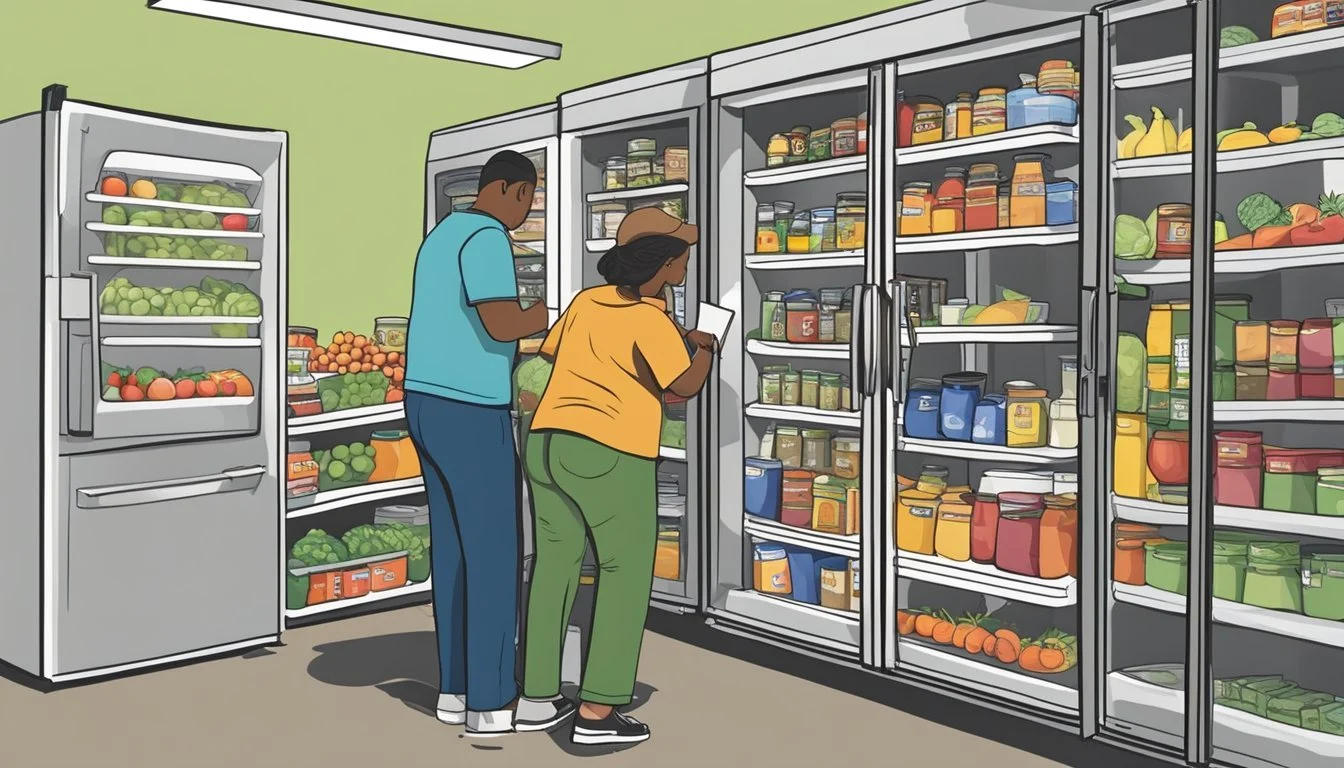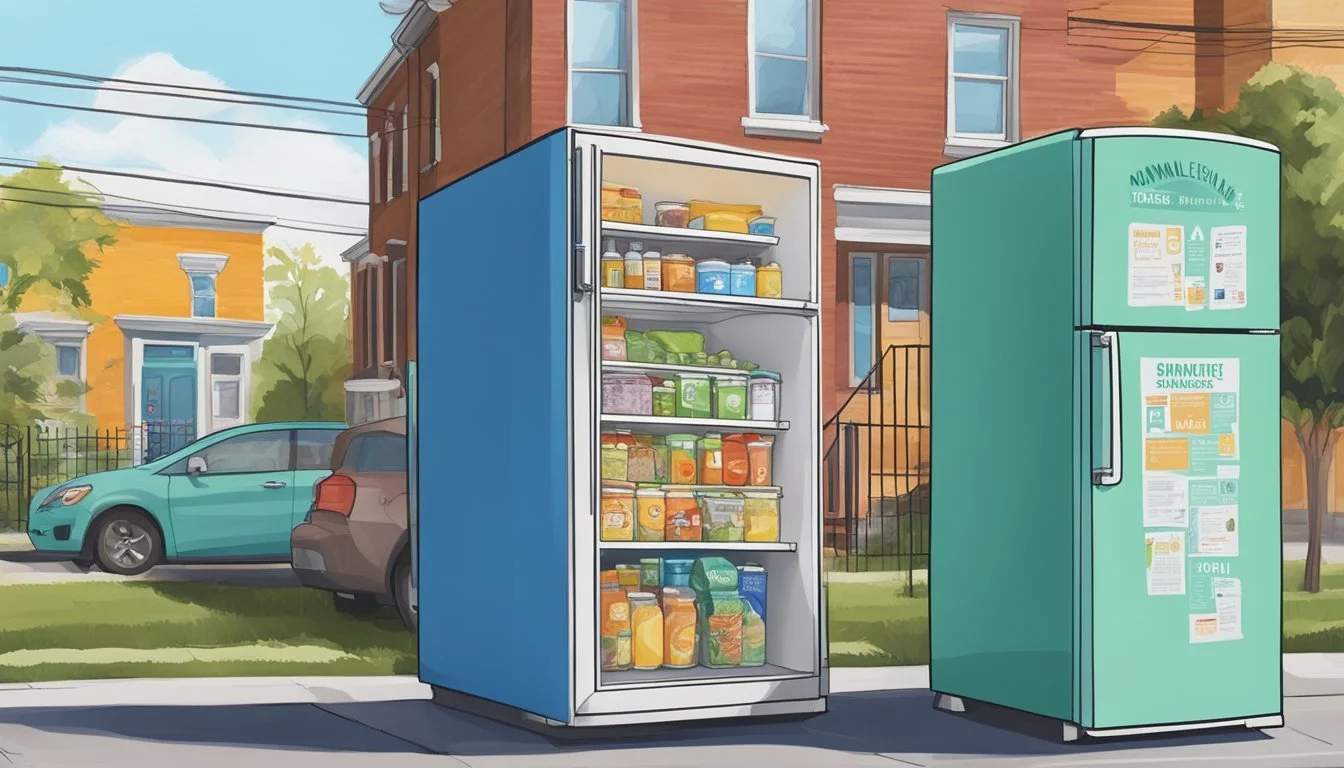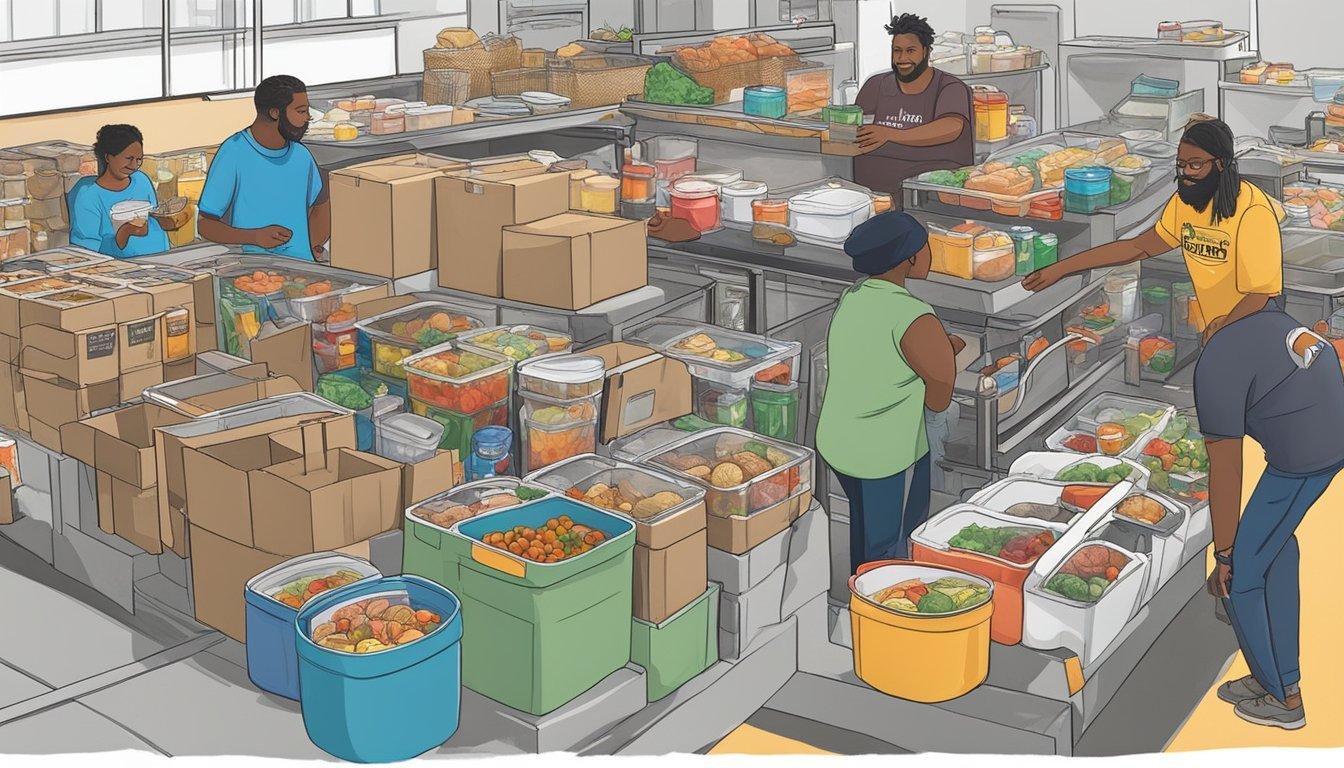Evansville, IN Community Fridge
Tackling Food Insecurity Locally
In Evansville, Indiana, a novel approach to addressing food insecurity and reducing waste has taken root in the form of the Community Fridge Evansville. This grassroots initiative embodies a simple, yet effective concept: a refrigerator and pantry that are accessible to the public, offering free food to anyone in need. By placing a refrigerator in a central location, Community Fridge Evansville invites residents to participate in a communal effort. Individuals and businesses donate food, while others who are in need are welcome to take what they can use, exemplifying shared community responsibility and support.
The implementation of the community fridge in Evansville serves as a beacon of solidarity, operating on the principle that access to food is a basic human right. Not only does it provide immediate relief to those facing food scarcity, but it also fosters a sense of belonging and community among citizens from all walks of life. The positive impact of the Community Fridge Evansville reverberates through the city, as it aligns with broader movements across the globe to establish similar fridges aimed at bolstering local food security.
Community Fridge Evansville operates on the foundation of community engagement and sustainability. With an underlying objective of reducing food waste, this project also brings environmental benefits to the table. By encouraging the sharing of surplus food that would otherwise be discarded, the fridge helps minimize the carbon footprint associated with food production and waste. Its presence in Vanderburgh County illustrates how localized actions can have a wide-ranging impact, inspiring other communities to adopt similar programs promoting environmental stewardship and social welfare.
Evansville Community Fridge: An Overview
The Evansville Community Fridge addresses food insecurity through sharing perishable goods and engaging with the local community in Evansville, Indiana.
Origins and Mission
The initiative to create the Community Fridge in Evansville began with the aim to combat waste and provide accessible food to those in need. It operates on the simple concept of "take what you need, leave what you can" to facilitate food sharing within the community.
Impact on Food Insecurity
Evansville's Community Fridge has made strides in reducing food insecurity by providing a 24/7 accessible point where individuals can find fresh groceries without stigma or barriers. Donations from individuals and surplus from businesses contribute to a sustained effort in fighting hunger locally.
Partnerships with Local Businesses
The success of the Community Fridge hinges on the strong partnerships with local businesses. These collaborations not only help in stocking the fridge regularly but also in diverting potential food waste from businesses to the mouths of those who need it most in the city of Evansville, USA.
Operating the Community Fridge
In Evansville, IN, the Community Fridge serves as a grassroots initiative combating food waste while providing accessible food resources. Its operation depends on adherence to safety protocols, cost management, and strategic placement.
Location and Accessibility
The Evansville Community Fridge is strategically located to maximize accessibility for those who need it. They often select sites with high foot traffic and 24/7 availability to ensure that food is accessible anytime to anyone in need. Hosting sites might include socially-conscious businesses, community centers, or churches that support the fridge's purpose.
Maintenance and Safety Guidelines
Community fridges must adhere to strict health and safety guidelines to ensure they are a reliable source of food. Maintenance includes:
Regular cleaning schedules
Ensuring food donations comply with safe consumption standards
Monitoring and restocking to maintain a balanced variety of food items
Training volunteers on proper food handling techniques
This vigilance is crucial, especially during times of the pandemic, to prevent any potential health risks.
Electricity and Operational Costs
The operational costs for running a community fridge are principally tied to electricity usage. On average, a fridge may incur about $150 in electricity costs annually in similar initiatives. To cover these expenses, the community may engage in fundraising efforts or seek sponsorships from local businesses. Community support plays a significant role in sustaining the fridge through donations and volunteering.
Managing and operating a Community Fridge requires continuous community support and adherence to set guidelines, ensuring it functions effectively as a resource for those in need and a tool for reducing food waste.
Donation Guidelines and Food Safety
When donating to the Evansville, IN Community Fridge, it's essential for donors to adhere strictly to food safety guidelines and understand what types of donations are acceptable. This ensures the health and well-being of the community while maximizing the positive impact of reducing waste.
Acceptable Types of Donations
Donations should closely align with the needs of the community and food safety standards. Acceptable items include:
Packaged, non-perishable foods: Ensuring they are within expiration dates.
Fresh fruits and vegetables: Preferred due to their nutritional value.
Sealed beverages: Such as bottled water and juice.
Items like granola/fruit bars, trail mix, nuts, and bottled drinks are particularly valued for their convenience and longevity.
Handling Raw Meat and Expiration Dates
Donors must take special precautions:
Raw Meat: Donations of raw meat are generally discouraged to prevent contamination and maintain safety.
Donations of perishable items should be within the use-by dates:
Dairy products: Clearly labeled and not beyond sell-by or use-by dates.
Prepared meals: They should contain a preparation date and consume-by recommendation.
Alcohol and Non-Food Items Policy
To comply with the law and safety protocols, the following items are not accepted:
Alcohol: Due to legal constraints, alcohol donations are strictly prohibited.
Non-food items: Unless specifically requested or part of a targeted drive, non-food items are not typically accepted.
Certain other items might be restricted: Always check the latest guidelines provided by the Tri-State Food Bank or local organizations overseeing the community fridge.
Community Involvement and Volunteering
The Community Fridge Evansville project thrives on the diverse contributions from local members and volunteers, fostering community engagement through various events and providing platforms for artists and advocates of mutual aid.
Roles of Members and Volunteers
Members and volunteers are the backbone of the Community Fridge Evansville initiative. Reanna Rowe, serving as an admin, exemplifies leadership by coordinating efforts to maintain the fridge. Volunteers have distinct responsibilities, including stocking and cleaning the fridge, ensuring the quality of the food shared, and engaging with community members to educate them about the project and food waste prevention.
Key Responsibilities:
Stocking the fridge with food
Routine cleaning and maintenance
Outreach and education on food waste
Events and Community Engagement
Community Fridge Evansville hosts events focused on sharing resources, creating connections, and promoting food availability. These events bring together residents, foster mutual support, and offer an opportunity for volunteers to get involved in direct action that benefits their neighbors.
Upcoming Events:
Food Donation Drives
Volunteer Training Workshops
Community Potlucks
Opportunities for Local Artists and Advocates
Local artists contribute to the attractiveness and visibility of the community fridge by transforming it into a public artwork. Advocates and volunteers use these spaces to connect with and educate the public on issues of food insecurity and collective support.
Open Calls:
Fridge Artwork: Seeking artists for fridge decoration
Community Advocacy: Inviting speakers for educational events
Collaboration with Mutual Aid Networks
The Evansville, IN Community Fridge initiative exemplifies the power of collaboration within mutual aid networks to provide essential resources while fostering community solidarity and justice.
Networking with Local and National Groups
Local efforts to address food insecurity have strengthened as the Evansville Community Fridge aligns with both local and national mutual aid groups. These alliances expand the reach and efficacy of their operations, ensuring a steady flow of supplies and information. They have tapped into a broader mutual aid movement, which underscores the importance of support networks over individual charity.
Local Connections: These involve partnerships with regional food banks, businesses, and non-profit organizations that align with their mission of food justice.
National Links: The initiative also benefits from sharing best practices and resources with a network of similar projects across the country, fostering a collaborative spirit.
Community Organizing and Solidarity
The Community Fridge is more than a standalone project. It serves as a beacon of community organizing, bringing individuals together in a collective pursuit of justice and support.
Organization: Individuals and groups are organized on principles of mutual aid, emphasizing shared responsibilities and community empowerment.
Solidarity: Solidarity takes precedence over charity, with the fridge acting as a tangible representation of the commitment to address issues of food scarcity and promote equity within the community.
Sustainability and Environmental Impact
The Evansville, IN Community Fridge initiative stands as a testament to the city's commitment to environmental sustainability. Through reducing food waste and nurturing support from environmental organizations, the program mitigates the ecological footprint of the community.
Reducing Food Waste and Carbon Footprint
Community Fridges in Evansville play a pivotal role in minimizing food waste, a significant contributor to greenhouse gas emissions when decomposing in landfills. By offering a place where individuals can leave surplus food and others can take what they need, these fridges help ensure that food is consumed rather than discarded. The direct effect of this initiative is a reduction in the carbon footprint associated with the generation of waste food. Notably, food waste reduction aligns with broader efforts to lessen the environmental impact of urban areas and contributes to creating a zero-waste community.
Key Benefits:
Prevents edible food from becoming waste: By facilitating food sharing.
Lowers methane emissions: Decreasing the amount of food decomposing in landfills reduces this potent greenhouse gas.
Promotes community sustainability: Encouraging local engagement in environmental responsibility.
Support from Environmental Organizations
Environmental organizations have recognized the significance of community fridges as a tool for engaging local populations in sustainable practices. These groups often provide vital support, ranging from educational resources to logistical aid, bolstering the effectiveness of such initiatives. Their involvement brings credibility and can amplify the reach of the message on the importance of reducing waste and protecting the environment. Their participation reflects a shared vision for a healthier, vibrant future and a more resilient community in the face of climate challenges.
Forms of Support:
Educational materials: To raise awareness and encourage participation.
Resources for operation: Including refrigeration technology that is climate-friendly.
Collaborative action: Enhancing the impact of initiatives through joint efforts.
The Community Fridge movement in Evansville, by involving community members and aligning with environmental agencies' goals, not only contributes to waste reduction but also plays a vital part in the broader narrative of environmental stewardship.
A Model for National and Global Movement
Community fridges offer a robust alternative to traditional food aid methods by allowing for direct and equitable access to food resources. They empower communities and foster a spirit of sharing and caring. This section delves into how the Evansville, IN Community Fridge serves as a prototype for similar initiatives nationwide and across the globe, shining light on transformative case studies and best practices that span continents.
Case Studies: New York City and Chicago
New York City: The Friendly Fridge, based in this metropolis, exemplifies the success of a locally driven resource sharing. The city's dense population has allowed for numerous fridges to be placed in areas of high need, ensuring an effective food distribution approach. Collaboration with local businesses has proven key for the sustainability and restocking of these fridges.
Key Success Points:
Placement in high-demand locales
Partnerships with local businesses and organizations
Chicago: The Love Fridge in Chicago has similarly aimed to address food justice by placing community fridges throughout the city. Their work complements existing food banks and extends food access to immediate, no-questions-asked provision.
Notable Strategies:
Strong volunteer networks
Emphasis on food justice and immediate access
Scaling up: Best Practices from Around the World
The global expansion of community fridges is a testament to their adaptability and effectiveness. Freedge and the Community Fridge Network operate as beacons for best practices and frameworks on how to implement and sustain community fridges.
Germany has been a leading example, demonstrating how community-based efforts can be scaled to national levels. The country's structure has allowed for a blend of local autonomy within a supportive overarching system.
Global Learning Points:
Freedge offers a vital database that facilitates the sharing of knowledge, from logistical considerations to local partnerships.
Networks: The success of community fridges in the U.S and elsewhere has been bolstered by networks that offer support and share successful strategies.
These examples highlight the vital role shared responsibility and community-level actions play in the fight against hunger. They function as case studies for new initiatives and underscore the global movement towards communal support and food distribution equity.
Challenges and Future Directions
In Evansville, Indiana, the Community Fridge initiative faces a variety of challenges and is exploring future directions to sustain and expand its positive impact on the community. These range from navigating the ebb and flow of food supply and demand to securing funding and contemplating wider network growth, all in pursuit of long-term objectives.
Food Supply and Demand Fluctuations
The equilibrium between food availability and the needs of the community is a delicate one. Food supply can be unpredictable, hinging on both ongoing donations and volunteering efforts. During events such as a pandemic, the demand can spike unexpectedly, further complicating this balance. The Community Fridge relies on consistent food donations to remain stocked, but must also ensure that surplus does not lead to waste.
Funding and Resources
Operational costs, such as electricity to power the fridges and transportation to facilitate the distribution of donations, represent a significant hurdle. The Community Fridge initiative must secure funding to cover these expenses. This often involves community-driven fundraising efforts and grant applications to maintain the service without interruption.
Expanding the Network and Long-Term Goals
Looking ahead, expanding the local Community Fridge network is essential. By increasing the number of fridges, more individuals in need can be served. Key long-term goals include securing a stable, continuous flow of resources and extending the reach to serve a larger segment of the Evansville community. However, such expansion requires careful planning to ensure each new fridge is sustainable and well-maintained.










